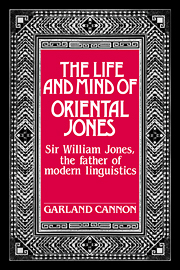Book contents
- Frontmatter
- Contents
- Preface
- Introduction
- Chronology of Jones's Life
- 1 A Barbaric Oriental Conqueror (to 1770)
- 2 Delicate Arab Maidens and Liquid Ruby (1770–1772)
- 3 Persian Jones and Constitutional Law (1772–1777)
- 4 The Athenian and Eleutherion (1778–1780)
- 5 An Ass Laden with Gold (1780)
- 6 Politics: Writings and Activism (1780–1782)
- 7 James River Property (1782–1783)
- 8 A Vision in the Indian Ocean (1783–1785)
- 9 A Sacred Oriental Language (1785)
- 10 A Genetic Explanation: Indo-European (1786–1787)
- 11 Sanskrit Literary Treasures (1787–1788)
- 12 An Indian Renaissance (1789)
- 13 A Burning Tropical Sun (1790–1791)
- 14 Scholar-Martyr (1791–1794)
- 15 Jones Today
- Appendix Five New Letters by Jones
- Notes
- Selected Bibliography
- Index
8 - A Vision in the Indian Ocean (1783–1785)
Published online by Cambridge University Press: 11 September 2009
- Frontmatter
- Contents
- Preface
- Introduction
- Chronology of Jones's Life
- 1 A Barbaric Oriental Conqueror (to 1770)
- 2 Delicate Arab Maidens and Liquid Ruby (1770–1772)
- 3 Persian Jones and Constitutional Law (1772–1777)
- 4 The Athenian and Eleutherion (1778–1780)
- 5 An Ass Laden with Gold (1780)
- 6 Politics: Writings and Activism (1780–1782)
- 7 James River Property (1782–1783)
- 8 A Vision in the Indian Ocean (1783–1785)
- 9 A Sacred Oriental Language (1785)
- 10 A Genetic Explanation: Indo-European (1786–1787)
- 11 Sanskrit Literary Treasures (1787–1788)
- 12 An Indian Renaissance (1789)
- 13 A Burning Tropical Sun (1790–1791)
- 14 Scholar-Martyr (1791–1794)
- 15 Jones Today
- Appendix Five New Letters by Jones
- Notes
- Selected Bibliography
- Index
Summary
The judgeship gave Jones what he wanted most. The salary permitted an extremely happy marriage and ensured the independence he had long sought. It also offered large professional responsibilities, for he would not have accepted a post primarily for the salary. He would finally serve humanity, a goal requiring his return to Orientalism, which was to produce his major accomplishments and greatest fame as he deepened his knowledge of India.
Jones was not exchanging an unsatisfactory political situation for an idyllic one, because the Regulating Act of 1773 had not created a smooth arrangement. Of North's appointees to the new Supreme Council, only Hastings was really knowledgeable about India; and Philip Francis influenced two other councilmen to form a majority in unending quarrels with him. As the Governor-General, Hastings was already having differences with the English ministry, and a near-feud soon developed. He was ably prosecuting the war to assist the wazir of Oudh, but Francis began to thwart his efforts and even usurp his authority. After he charged the fiery Francis with breach of trust, Francis was wounded in their duel in 1780 and returned home vowing revenge. Francis passed information to Burke, who decided that Hastings was the worst delinquent ever in India. This information figured prominently in the debates culminating in the decisions to recall Hastings and Chief Justice Impey.
- Type
- Chapter
- Information
- The Life and Mind of Oriental JonesSir William Jones, the Father of Modern Linguistics, pp. 195 - 221Publisher: Cambridge University PressPrint publication year: 1991



